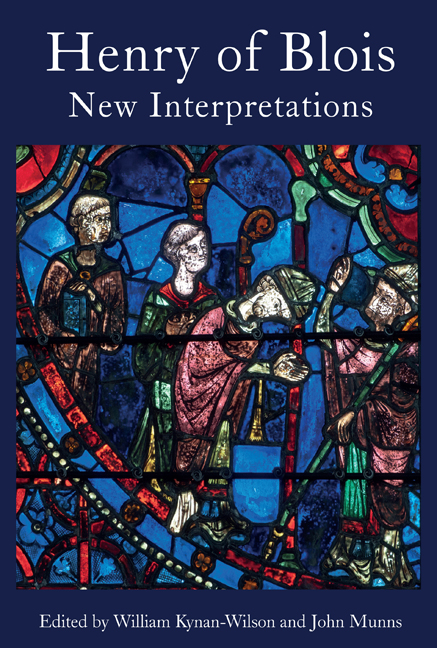Book contents
- Frontmatter
- Dedication
- Contents
- List of Illustrations
- List of Contributors
- Acknowledgements
- List of Abbreviations
- Genealogical Table: The Family Connections of Henry of Blois
- Introduction: Approaches to Henry of Blois
- 1 Causa Dei Et Ecclesie Cluniacensis: Henry of Blois and Cluny
- 2 Henry of Blois and His Legation in England
- 3 The Episcopal Colleagues of Henry of Blois
- 4 The Architectural Heritage of Bishop Henry of Blois at Winchester Cathedral
- 5 Wolvesey: Henry of Blois’ Domus Quasi palatium in Winchester
- 6 Bishop Henry’s Bible
- 7 Henry of Blois and the Construction of Roman Identity
- 8 Henry of Blois: Between Patronage and Representation in the Long Twelfth Century
- 9 The Last Days of Henry of Blois
- Timeline
- Bibliography
- Index
- Plate Section
3 - The Episcopal Colleagues of Henry of Blois
Published online by Cambridge University Press: 09 February 2021
- Frontmatter
- Dedication
- Contents
- List of Illustrations
- List of Contributors
- Acknowledgements
- List of Abbreviations
- Genealogical Table: The Family Connections of Henry of Blois
- Introduction: Approaches to Henry of Blois
- 1 Causa Dei Et Ecclesie Cluniacensis: Henry of Blois and Cluny
- 2 Henry of Blois and His Legation in England
- 3 The Episcopal Colleagues of Henry of Blois
- 4 The Architectural Heritage of Bishop Henry of Blois at Winchester Cathedral
- 5 Wolvesey: Henry of Blois’ Domus Quasi palatium in Winchester
- 6 Bishop Henry’s Bible
- 7 Henry of Blois and the Construction of Roman Identity
- 8 Henry of Blois: Between Patronage and Representation in the Long Twelfth Century
- 9 The Last Days of Henry of Blois
- Timeline
- Bibliography
- Index
- Plate Section
Summary
In his study of the English bench of bishops during the Becket crisis, David Knowles made repeated references to Henry of Blois’ nepotism: ‘another nephew and candidate put forward by Henry’, ‘one of the numerous nephews whose interests were furthered by their uncle, Henry of Blois’, ‘yet one more of his nephews’, ‘an English monk elected by his brethren he stood apart at once … from the relatives and young men of Henry of Winchester’. Knowles was by no means the first to intimate that the bishop of Winchester's behaviour in this regard was exceptional. In his own day, Henry's shameless promotion of members of his familia was one of the causes of Bernard of Clairvaux's righteous outrage, and the notoriety of nepotism has clung to him ever since. Yet the English bench of the 1160s also included a bishop of London who had lobbied for his uncle's election to the throne of Lincoln; a bishop of Rochester who had been appointed by his own brother; a bishop of Ely who was the nephew of a former bishop of Salisbury, a cousin (or brother) of the late bishop of Lincoln, and the father of a future bishop of London; a bishop of Coventry who was the son of his predecessor; bishops in Salisbury and Durham who had sired at least some of their respective archdeacons; and a bishop of Chichester who was uncle to one of his.
By the time Henry died on 8 August 1171, he had occupied Winchester's episcopal throne for nearly forty-two years. In that time, he had forty-five episcopal colleagues in the English Church [Table 3.1], and eleven more served the dioceses of Wales. The bishops and clergy of the Norman duchy were closely integrated with their English counterparts, and at least some of the Scottish and Irish bishops were regular participants in English affairs. At the time of Henry's enthronement in 1129, all but two of the other fourteen dioceses in England were occupied; when he died in 1171, he did so as the doyen of a depleted English episcopate, half of whose dioceses now stood vacant.
- Type
- Chapter
- Information
- Henry of BloisNew Interpretations, pp. 69 - 92Publisher: Boydell & BrewerPrint publication year: 2021



